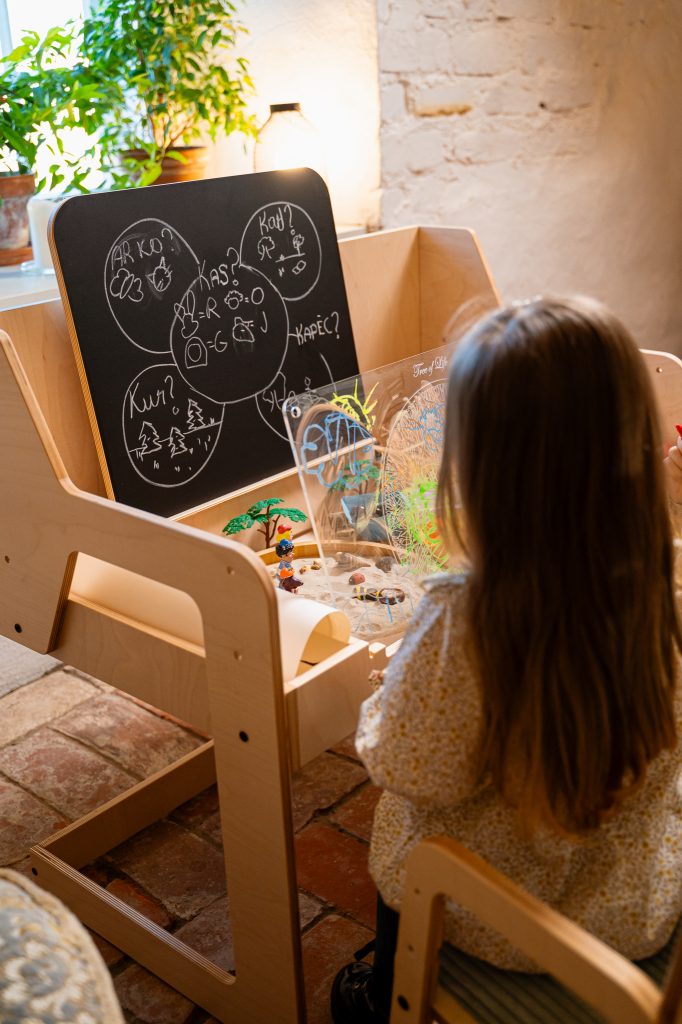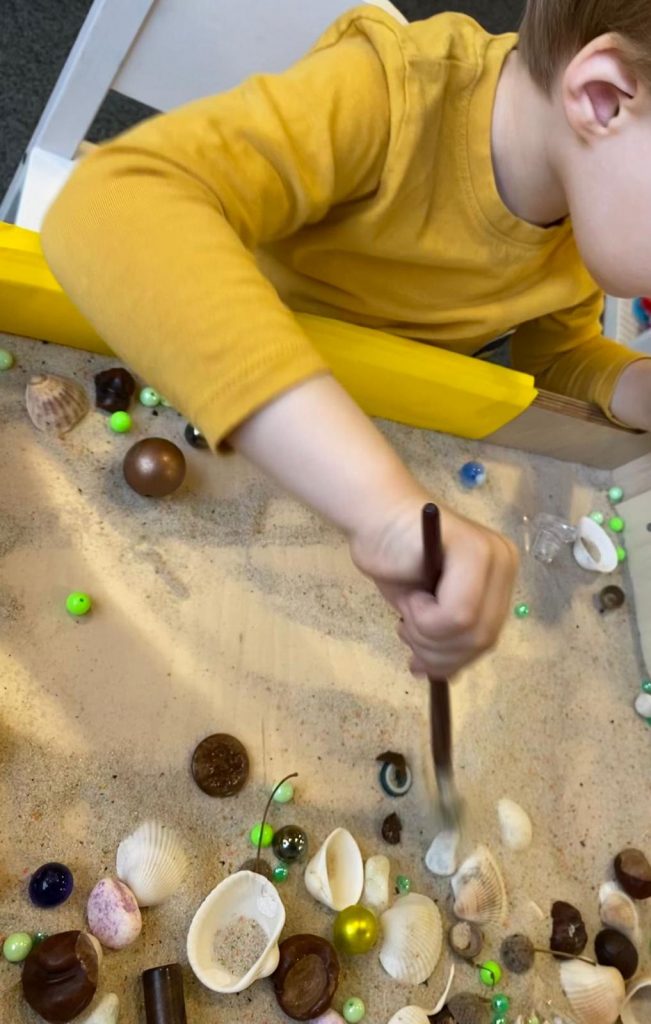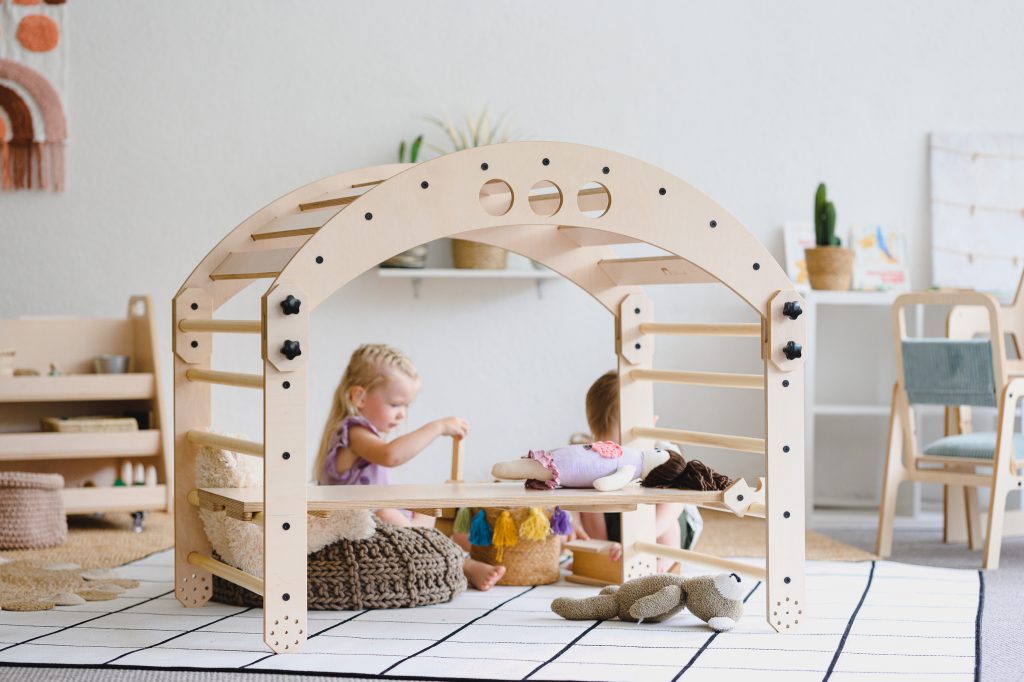Common Challenges in Families without Independent Play
In families where children struggle to play independently, parents often face several common challenges in their daily lives. Firstly, there’s the constant demand for attention and engagement from the child, which can leave parents feeling exhausted and overwhelmed. Additionally, without independent play skills, children may struggle to entertain themselves, leading to boredom and frustration for both the child and the parents. Moreover, relying solely on structured activities or screen time to keep children occupied can hinder their ability to develop essential skills for self-directed play.

Photo: Lauris Hercenbergs Clothes: Paade Mode Thanks for Nurmuižas pils
How to Help Children Learn to Play Independently
Encouraging independent play doesn’t mean leaving children completely unsupervised. Instead, it involves providing them with the space, time, and resources to explore and engage in self-directed activities. Here are some strategies to help children learn to play independently:
- Create a Safe and Stimulating Environment: Set up a designated play area with age-appropriate toys, books, and materials that encourage open-ended play and exploration.
- Set Realistic Expectations: Start with short periods of independent play and gradually increase the duration as the child becomes more comfortable. Be patient and supportive as they learn to entertain themselves.
- Model Independent Play: Show your child how to engage in independent play by demonstrating how to use toys and materials creatively. Offer praise and positive reinforcement when they play independently.
- Limit Screen Time: Reduce reliance on screens and electronic devices, as they can hinder imaginative play and creativity. Encourage activities that require active engagement and physical movement.
- Encourage Outdoor Play: Outdoor play provides children with opportunities for exploration, physical activity, and imaginative play. Encourage outdoor adventures and unstructured play in nature whenever possible.
- Provide Opportunities for Social Interaction: While independent play is important, it’s also essential for children to interact with peers and family members. Arrange playdates or participate in group activities that allow children to socialize and collaborate with others.
The Impact of Independent Play on Child Development and Family Life
Research has shown that independent play plays a crucial role in child development. According to Dr. Peter Gray, a leading expert on play and evolutionary psychology, independent play allows children to develop problem-solving skills, creativity, and emotional resilience. In his article “The Value of Play I: The Definition of Play Gives Insights,” Gray emphasizes the importance of unstructured, child-directed play in promoting cognitive, social, and emotional development.
Furthermore, independent play benefits parents by providing them with much-needed time for self-care, work, or household tasks. When children are engaged in independent play, parents can have moments of respite to recharge and focus on their own needs. Additionally, promoting independent play fosters a sense of independence and self-reliance in children, which can lead to smoother transitions to school and other social settings.
How to Engage as a Parent During Child’s Playtime: Balancing Involvement in Creative Activities
The role of parents during a child’s playtime is crucial, and there are many ways parents can engage and support children in creative activities. It’s essential to understand that children need both time to play independently and time when parents are present and actively involved in fostering creativity and development.

How to Engage as a Parent During Child’s Playtime:
- Be Present and Available: Initially, it’s essential just to be present and available, so the child knows that the parent is there if they need assistance or support.
- Provide Resources and Materials: Parents can provide children with various resources and materials that promote creativity, such as paints, crayons, craft supplies, or building blocks.
- Support Child’s Initiative: Parents can support the child’s interests and initiative by allowing them to choose activities and themes to play or creatively engage with.
- Encourage and Facilitate Experimentation: Parents should encourage children to experiment and try new things, even if the result isn’t perfect. This way, the child develops their creativity and adventurous spirit.
- Participate and Share Interests: Parents can offer their ideas and interests to participate in creative activities together. It could be a joint drawing project, artistic experimentation, or a trip to a museum or gallery.
- Be Patient and Open-Minded: It’s essential to be patient and open-minded about the child’s ideas and expressions, even if you don’t fully understand or agree with their thoughts or creative solutions.
- Support Child’s Independence: While it’s essential to engage in a child’s play, it’s also crucial to support their independence and self-expression. Parents can provide support without interfering or controlling the child’s actions.

Photo: Lauris Hercenbergs Thanks for Amēlijas istaba
Overall, parents can find many opportunities and ways to be present and support a child during playtime, fostering their creativity, development, and emotional well-being.
In conclusion, independent play is essential for children’s development and well-being. By providing children with opportunities for self-directed play, parents can support their growth, creativity, and independence. As parents, fostering independent play not only benefits our children but also enhances our own well-being and strengthens family dynamics.
References:
- Gray, Peter. “The Value of Play I: The Definition of Play Gives Insights.” Psychology Today, 29 Mar. 2010, www.psychologytoday.com/us/blog/freedom-learn/201001/the-value-play-i-the-definition-play-gives-insights.
- Lillard, Angeline S. Montessori: The Science Behind the Genius. Oxford University Press, 2007.
Further Reading:
- American Academy of Pediatrics. “The Power of Play: A Pediatric Role in Enhancing Development in Young Children.” Pediatrics, vol. 129, no. 5, May 2012, pp. 1–6.
- Ginsburg, Kenneth R. “The Importance of Play in Promoting Healthy Child Development and Maintaining Strong Parent-Child Bonds.” Pediatrics, vol. 119, no. 1, Jan. 2007, pp. 182–191.
- The LEGO Foundation. “Learning through Play: A Review of the Evidence.” 2018, www.legofoundation.com/media/1065/lego-play-wp-english-web.pdf.